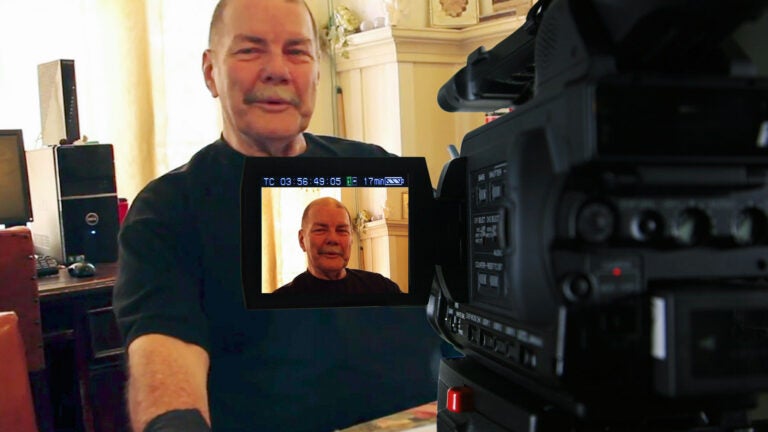
Students help to address social issues through writing and filmmaking
Undergraduates showcase the work of partners in the community
OPEN ON BLACK
CUT TO: INT. VEHICLE, VIEW THROUGH WINDSHIELD — DUSK.
The vehicle heads north up a freeway onramp, passing under several bridges. The hum of the vehicle in motion is all we hear. The camera’s focus blurs slightly.
CUT TO: BLACK BACKGROUND.
The hum from the vehicle continues as letters fade into view — a date and time: APRIL 11, 2016, 7:43 P.M.
Below these, more letters fade into view: WE ARE ON OUR WAY TO PICK UP JAMES.
So begins the mini-documentary The Francisco Homes Intake, which introduces us to James, a 74-year-old former inmate who has just been released after 33 years in state prison. The film traces his pickup from L.A.’s Union Station by a representative of The Francisco Homes, a faith-based organization that offers support to formerly incarcerated individuals as they attempt to re-integrate into society after long sentences.
Speaking slowly and brimming with understated charm, James speaks with the driver about his surreal day as they drive to Denny’s for his first meal outside of prison gates. James candidly reflects on the experience of re-entry as well as his many years in prison. He shares a moving anecdote about a woman with her son at the train station who, upon learning he has just been released, offers him a welcoming hug. He talks about the adult daughter he has never met but hopes to soon.
‘We wanted to do something different’
The film was created by a group of undergraduates from the course “Writing 340: Writing in the Community.” The general education class unites students from across USC with community organizations, using the students’ writing and rhetorical skills to help address social issues.
We wanted to do something different, something that would engage the community as partners rather than clients or subjects.
Stephanie Bower
“We wanted to do something different, something that would engage the community as partners rather than clients or subjects, each partner bringing something to learn and something to teach,” said Stephanie Bower, co-instructor of the course along with John Murray. Both are associate professors (teaching) of writing at the USC Dornsife College of Letters, Arts and Sciences. “We wanted to challenge rather than confirm the implicit hierarchy that values only the expertise, knowledge and discourse produced by the university.”
During the course, students partner with community groups such as schools, nonprofits or social justice organizations and collaborate in making short films for their final project.
“[This] positions our students as facilitators rather than as experts, engaged in the mutual project of using stories to experience the world through unfamiliar perspectives,” Bower said.
A rewarding experience
Audrey Weber ’16, who graduated from USC Dornsife with a degree in international relations, was a member of the student group that worked with The Francisco Homes. Murray encouraged the class to work with an organization that would take them out of their comfort zone, directions that Weber took to heart.
“Having never known someone who has served a life sentence for a violent crime, working with Francisco Homes was uncomfortable for me, but it was also one of the most rewarding experiences of my college career,” she wrote in her post-course reflection. “I now better understand the systemic issues of poverty and gang activity that drive many people to commit crimes and now see those people not as criminals, but as human beings. The men at Francisco Homes … are some of the kindest, sincerest people I have ever met.”
Junior Evelyn Lee has a double major in human biology at USC Dornsife and health promotion and disease prevention at the Keck School of Medicine of USC. Her group worked with Healthy Kids Club, a program of California Health and Wellness that combats childhood obesity.
Lee has been involved in community service during her time as a student, from teaching science to kids through USC Dornsife’s Joint Educational Project to volunteering at a homeless shelter. But the writing class helped shift her perspective, as she wrote in her reflection.
“Within a week of starting this course, I was forced to reevaluate my community involvement. I always strived to ask myself, ‘How can I help? How can I make these situations better?’ rather than, ‘Why do these problems exist? Why were these programs I spend so much of my time with created in the first place?’”
A life beyond the classroom
Learning to focus on these deeper questions and the privilege of showcasing the hard work and passionate dedication exhibited by her community partner weren’t the only benefits of the class, Lee wrote.
“It was an honor being taught by the most inspirational professors — educators who don’t simply aim to teach how to write but rather teach us how to shape our perspectives as privileged college students.”
Weber agreed, praising her instructors and their teaching style.
“John and Stephanie are different than every other professor I have had at USC; they want their students’ work to be seen and read beyond the confines of the classroom,” she wrote.
Students were encouraged to share their class work with family and friends, and even to submit their final documentary projects to festivals and newspapers. Many did so.
“For the first time in my college career,” Weber wrote, “I have felt that my classwork is valuable and useful, and that I have the potential to produce a piece of writing or a project that could make a positive difference in my community.”
Even the professors were affected by the experiences of their students.
“Not only are our community partners extraordinary, but so are the students who take this class,” Murray said. “They work so hard to make these collaborations succeed. It’s really the sort of experience — for all of us, I think — that reinforces our beliefs about the value of human connection.”
